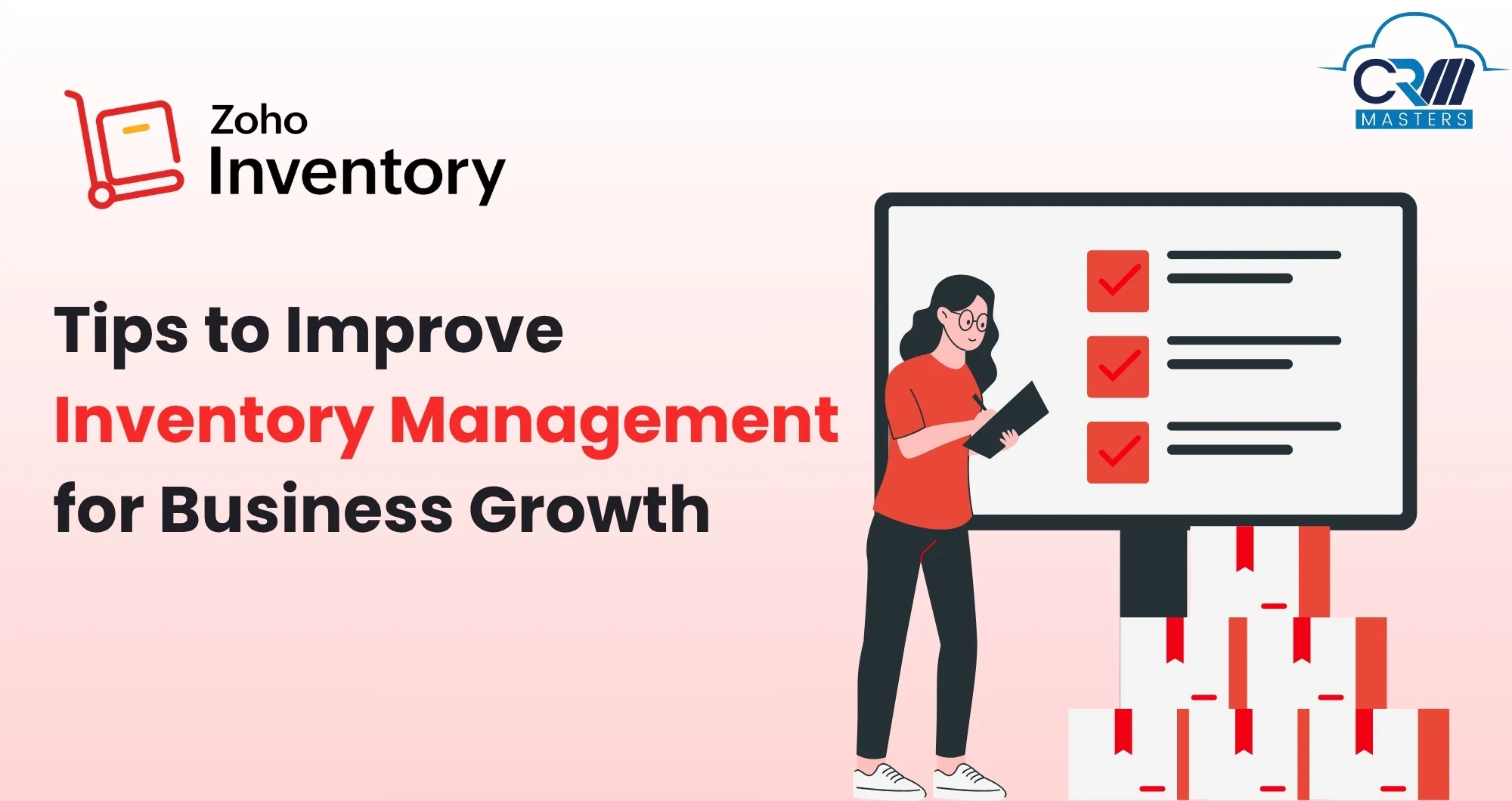
Tips to Improve Inventory Management for Business Growth
Inventory can make or break a business, literally. For many companies, it becomes the silent reason for lost profits, unhappy customers, and operational confusion. Stockouts, excess inventory, late deliveries, incorrect shipments, or managing hundreds of items manually can quickly drain time and money. And with customers expecting same-day updates, real-time tracking, and quick deliveries, having an efficient Inventory Management system is no longer a “backend task”… it’s a growth strategy.
Today’s modern businesses, whether ecommerce stores, wholesalers, distributors, or multi-warehouse operations, are scaling faster than ever because they prioritize smart inventory practices. They use integrated systems, keep full visibility of stock, forecast demand accurately, and streamline order flows. If you want your business to grow consistently without operational stress, then improving inventory management must be at the top of your priority list.
This blog will walk you through powerful, practical, and easy-to-apply strategies to strengthen your inventory processes, avoid common mistakes, and unlock smoother operations.
Why Good Inventory Management Drives Business Growth

Many businesses underestimate how deeply inventory influences customer experience and profitability. When stock is managed well, operations run smoothly and customers receive exactly what they ordered, on time. But when inventory is poorly managed, even the strongest marketing campaigns fail because products aren’t available, orders get delayed, and returns increase. This is why a good Inventory Management software like Zoho Inventory is now a necessity to use, and for this, you can connect to a trusted Zoho Implementation Partner.
1. Inventory Management Helps You Avoid Costly Mistakes
Inaccurate stock records lead to unnecessary purchases, blocked capital, overflowing warehouses, and items approaching expiry. Effective inventory management helps prevent both stockouts and overstocking, ensuring the right balance at all times.
2. It Improves Customer Satisfaction
When customers receive timely updates, accurate deliveries, and quick service, they trust your brand more. Smooth order fulfillment builds long-term loyalty and increases repeat purchases.
3. It Enables Better Decision-Making
With proper tracking, reporting, and analytics, you understand which items sell the fastest, which stay idle, and how demand changes seasonally. This insight helps you plan smarter and save more.
4. It Boosts Team Efficiency
When all departments, sales, warehouse, finance, and procurement work with the same accurate data, coordination improves, errors reduce, and productivity skyrockets.
Good Inventory Management is not just a requirement; it’s the backbone of scalable business operations.
Core Elements of Effective Inventory Management

Before jumping into improvement tips, it’s important to understand the essential elements that strengthen your inventory structure. These pillars form the foundation for smooth stock flow and accurate order processing.
1. Real-Time Visibility & Tracking
Real-time tracking allows you to monitor item movement across warehouses, batches, and sales channels. When you know exactly what you have and where it is, you eliminate guesswork and make better decisions.
This includes visibility into:
- Items nearing expiry
- Batches or serial numbers
- Stock movement between locations
- Order status updates
- Items reserved for upcoming orders
2. Centralized Order Management
Order management becomes complex when your business grows across channels. Handling purchases, sales, and returns separately often causes mismatches. Centralizing the entire process in one system helps maintain consistency and reduces human error.
3. Warehouse Organization & Flow
A well-structured warehouse reduces time spent searching for items and prevents picking mistakes. This includes setting up defined storage areas, using barcodes, and automating picklists to improve efficiency and accuracy.
4. Demand Forecasting
Forecasting helps you anticipate customer needs based on trends and past sales performance. Companies with accurate forecasting minimize wastage, reduce storage costs, and maintain steady product availability.
5. Reporting & Insights
Reports reveal your inventory’s hidden story. They show your best sellers, slow-movers, seasonal items, and overall warehouse performance. These insights help you adjust your purchasing and stocking strategy instantly.
With these essential elements in mind, let’s now explore the most effective ways to improve your inventory management.
Also Read: How Zoho Inventory Makes Inventory Simple for Indian Businesses
Tips to Improve Inventory Management for Steady Business Growth

Here are powerful, actionable tips, each explained in detail, to help you optimize your inventory process and steer your business toward growth.
1. Centralize Your Inventory to Avoid Mismatches
One of the biggest mistakes growing businesses make is managing inventory on spreadsheets or different software systems. This creates inconsistent data, slow updates, and confusion across teams. When you use a centralized inventory management system, every update, sales, purchase, return, and stock transfer syncs automatically across all locations.
This unified approach gives you complete accuracy, eliminates duplication, and ensures that every team works with the same updated information. Whether you’re selling across ecommerce platforms, offline branches, or wholesale channels, centralization keeps everything streamlined and error-free.
2. Implement Serial Numbers and Batch Tracking for Precision
If your business deals with perishable items, electronics, or multi-variant products, serial and batch numbers are crucial. They help trace individual product journeys from purchase to delivery. This detailed tracking improves accountability and avoids mix-ups during returns or warranty claims.
Batch tracking also helps you monitor expiry dates, quality issues, and manufacturing timelines. This not only enhances operational precision but also builds customer trust.
3. Set Intelligent Reorder Points to Prevent Stockouts
Stockouts harm both your revenue and brand image. By settling reorder points for each item based on demand patterns and supplier lead times, you ensure restocking happens at the right moment. A smart reorder point system alerts you automatically when stock levels fall below a threshold.
This minimizes emergency purchases, avoids rush shipping charges, and ensures customers always get what they need without delay.
4. Use Warehouse Automation to Speed Up Fulfillment
If your warehouse team spends too much time searching for items or manually picking orders, it’s a sign you need automation. Tools like barcode scanning, automated picklists, and digital packing slips streamline the fulfillment process.
Organized shelves, logical item grouping, and digital workflows help pickers work faster and more accurately. Automation reduces errors, speeds up order dispatch, and creates a more efficient warehouse environment.
5. Regularly Audit Your Inventory to Maintain Accuracy
Even the best systems need checks. Regular audits, weekly, monthly, or quarterly, help ensure that the actual stock matches system records. This minimizes long-term discrepancies, highlights damaged or misplaced items, and keeps your inventory database healthy.
Cycle counts, spot checks, and annual physical audits all contribute to better stock accuracy and operational clarity.
6. Optimize Multi-Channel Selling With Centralized Stock Updates
If you sell on platforms like Amazon, Shopify, eBay, or offline retail, multi-channel syncing is essential. Without real-time stock updates, overselling becomes very common. By integrating all channels into one system, your inventory automatically adjusts when an order is placed anywhere.
This real-time syncing protects you from selling unavailable items and ensures customers receive smooth service every time they buy from your brand.
7. Monitor Data & Insights to Make Smart Business Decisions
Inventory data reveals powerful insights, best-selling items, peak seasons, slow movers, sales channel performance, and more. Using these insights, you can plan purchases better, reduce dead stock, and increase profitability.
When you have accurate and timely reports, you make decisions confidently and grow your business in a strategic direction.
8. Improve Supplier Relationships for Faster Restocking
Your suppliers play a major role in how smoothly your inventory operates. Building strong relationships with them ensures faster order processing, better pricing, and predictable delivery times. When you collaborate closely with suppliers, you can communicate demand changes easily and avoid last-minute shortages.
Good supplier management becomes a hidden but powerful asset for business growth.
Strong Inventory Management with Zoho Inventory
Inventory is not just a collection of products; it’s the backbone of your business operations. When you manage it wisely, everything else becomes smoother: order fulfillment, customer experience, warehouse operations, and overall growth.
Whether you’re expanding to new markets, managing multiple warehouses, or trying to improve your delivery speed, strong Inventory Management with Zoho Inventory gives you the clarity, control, and confidence you need to scale.
If you’re ready to upgrade your inventory processes, connect with CRM Masters, a trusted Zoho Partner with 9+ years of experience. We have a team of 100+ experienced Zoho Developers who can help you with Zoho Implementation.
FAQs
Q1. Why is inventory management important for business growth?
Ans. Proper inventory management helps reduce costs, improve customer satisfaction, and streamline order fulfillment, leading to smoother operations and faster growth.
Q2. How can small businesses improve inventory management?
Ans. Small businesses can start by centralizing stock data, setting reorder points, tracking items accurately, and conducting regular audits.
Q3. What is the role of forecasting in inventory management?
Ans. Forecasting helps predict customer demand so you can stock the right amount without over-purchasing or risking stockouts.












